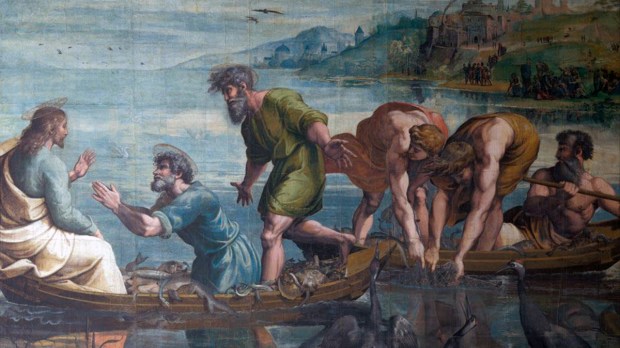“Put out into the deep and let down your nets for a catch.”
Those words of Jesus Christ were also favorites of St. John Paul II, and 20 years ago, he got very practical about what they should mean for us in our time.
He gave a very specific plan for the years that would follow the year 2000, and promised it would bring the same result as it did for Simon: “When they had done this, they caught a great number of fish.”
The Church has had a tough 20 years since then.
St. John Paul spelled out his plan in the 2001 Apostolic Letter “At the Beginning of the Millennium.” Disaster followed. First came 9/11, which turned many people against religion; then came the scandals, which turned many people against the Church. After that, smartphones and social media fractured people into like-minded — and close-minded — groups, speeding up the rise of the nones.
In revisiting St. John Paul’s words, we may feel exactly like Simon, who said: “Master, we toiled all night and caught nothing!” Fine. But what he said next was: “But at your word I will let down the nets.”
Jesus’ plan was simple — let down your nets — and St. John Paul’s was simple too.
John Paul said he didn’t want to invent “a new program.” He just asks for ordinary holiness (Nos. 30-31 in the letter) focused on Jesus.
The first thing to promote, he said, is prayer.
Before all else, pray (Nos. 32-34). Talk to Jesus. Be his friend. Then, invite people to join you.
The first people to pray with are your family. If you’re not in the habit of praying out loud with others, it can feel awkward at first. Do it anyway, and you will find that it soon feels natural — and changes a family’s dynamic for good.
The next thing to do is to invite others to pray with you. One great way to do it is with the Rosary. I love Mike Scherschligt’s apostolate of gathering family and friends for a meal and a Rosary. He turned it into a remarkable podcast that reaches people throughout the world — but it can work in your living room, too.
Second, promote Sunday Mass.
I love the humility of St. John Paul’s plan. He doesn’t ask for Eucharistic Adoration, though that’s a great practice; he doesn’t even ask for daily Mass. He asks for Sunday Mass (Nos. 35-36).
We can fall into the trap of thinking that Sunday Mass is no big deal, and not worth promoting. That’s a huge mistake. After all, it is “the summit toward which the Church’s action tends and at the same time the source from which comes all her strength,” says Vatican II.
Simply committing to go to Mass every Sunday, no matter what, will transform a family. And if each Aleteia reader started inviting others to Mass, not only the Church but the whole world would be changed.
Third, John Paul II said to invite people to the sacrament of Reconciliation.
St. John Paul II often spoke about the need to revive confession in our parishes. He said that the sacrament was “in crisis” and this was driving the plague of our times: The loss of the sense of sin.
The answer: confession. He asked for “confidence, creativity, and perseverance in presenting it and leading people to appreciate it” (No. 37). Pope Francis has been a great model of this, with his “24 Hours for the Lord” initiative, and by his personal witness, going to confession in public and hearing confessions. I have found that just casually mentioning confession is enough to spark others to go.
Fourth: John Paul says to rediscover Scripture.
St. John Paul says nothing in his plan will happen without grace (No. 38) and that comes most often from hearing the Word (No. 39) and proclaiming the Word (40-41).
It is remarkable how in the past 20 years, John Paul’s plan has played out, whether intentionally or not. He asks people to rediscover the prayerful reading of Scripture called lectio divina, and today, Aleteia, Hallow, the iBreviary promote just that. He also asks for all of us — and not just specialists — to become “servants of the word” (No. 40) and remarkable biblical apostolates have risen up.
We can’t even imagine the good this will do. John Paul says the word of God, sown in good soil, will yield a hundredfold (No. 41).
Fifth, he asks for love: with one another, and with the poor.
He has a lot of things to say that apply to bishops and leaders — and they should look them up. But the big takeaway for the laity, I think, is “Witnesses to Love” (No. 42) who “Stake everything on charity” (No. 43).He wants us to love our families and fellow parishioners, and let that love pour out to the poor.
The beauty of John Paul’s “program” is its simplicity.
No need for anything complicated. No need to take a difficult course or adopt a strange way of life. Just ask others to join us as we pray, worship, confess, read the Bible, and serve.
The result will be astonishing.
Go deeper in this theme at the author’s podcast here.

